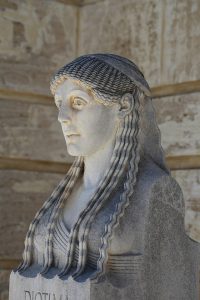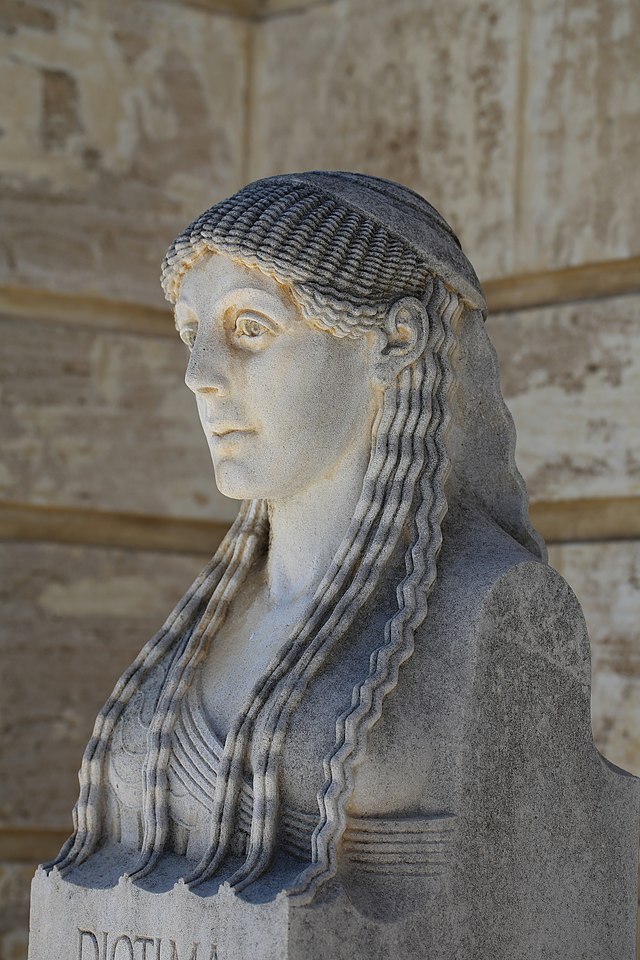 Diotima of Mantinea
Diotima of Mantinea
*ca. 440 BCE (Mantinea )
†ca. 440 BCE
Diotima was a Greek priestess and philosopher of antiquity. In current scientific discourse, her historical existence is discussed controversially. Information about her can be found in Plato’s dialogue “Symposium”. According to this, she had performed sacrificial acts in Athens to fight the plague.
In a conversation about the meaning of love, she teaches Socrates about the true Eros. In Diotima’s concept of love, Eros is a symbol of human striving for perfection and represents the desire for the emergence of the beautiful. Accordingly, she defines the concept of love as the birth of the beautiful, in spiritual and physical terms.
-
Primary Sources
-
Secondary Sources
Kranz, W. (1926). Diotima von Mantinea. In: Hermes, vol. 61 (4), 437-447.
Sier, K. (1997). Die Rede der Diotima. Stuttgart: Teubner.Meyer, U; Bennent-Vale, Heidemarie (Hg.) 1997. Philosophinnen Lexikon. Leipzig: Reclam.
Plato (1971). Symposium. Jowett, B. (trans.). In Hutchins, R.M. (ed.): The dialogues of plato. Great books of the western world, vol. 7. (pp. 149-173). Encyclopaedia Britannica, Chicago.
Riegel, N. (2016). Cosmópolis: mobolodades culturais às origens do pensamento antigo. Eryximachus and Diotima in Plato’s Symposium. Universidad de Coimbra.
Urban Walker, M. (2005). Diotima’s Ghost: The Uncertain Place of Feminist Philosophy in Professional Philosophy. In: Hypatia 20 (3). 153-164.
Waithe, M. E. (1987). Diotima of Mantinea (pp. 83-116). In Waithe, M.E. Ancient Women Philosophers 600 B.C. – 500 A.D. Springer, Dordrecht. Ed. 1
Wawrytko, S. A. (2018). Women on love – Idealization in the philosophies of diotima (symposium) and murasaki shikibu (the tale of genji). In: Philosophy east and west 69 (1).
Wider, K. (1986). Women philosophers in the ancient greek world: Donning the mantle (pp.21-62). In: Hypatia 1 (1)
Zambrano, M. & Jesús, M. (1993). La mujer: Diótima de Mantinea y Eloísa (pp. 358-380). In Jesús, M. (Ed.) La razón en la sombra: antología. Madrid: Ed. Siruela
Zehnpfennig, B. (2007). Die Rolle der Diotima in Platons Symposion (pp- 190-209). In: Havlicek, A. & Cajthami, M. (eds.). Plato’s Symposion. Proceedings of the Fifth Symposium Platonicum Pragense. Prague: Oikoumene.
- Online Sources
-
ECC
- Ascent in Diotima of Mantinea (ca. 440 B.C.E.)
- Beauty in Diotima of Mantinea (ca. 440 B.C.E.)
- Immortality in Diotima of Mantinea (ca. 440 B.C.E.)
- Love in Diotima of Mantinea (ca. 440 B.C.E.)
- Soul in Diotima of Mantinea (ca. 440 B.C.E.)
- Alma em Diotima de Mantinea (ca. 440 B.C.E.)
All entries on Diotima of Mantinea.
- Media
- Projects
You cannot copy content of this page











